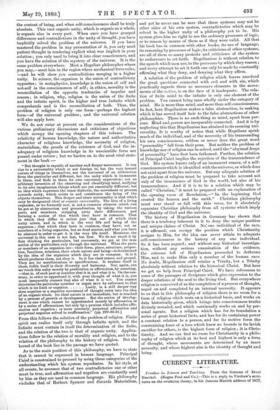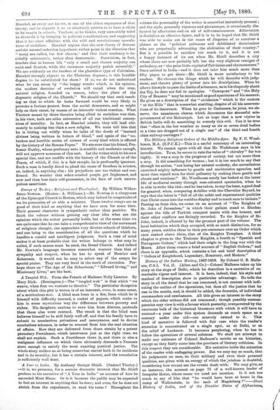CURRENT LITERATURE.
Freedom. in Science and Teaching. From the German of Ernst Haeckel. (Kogan Paul and Co.)—This is a reply to Virchow's stric- tures on the evolution theory, in his famous Muni& address of 1877. Ilaeckel, as every one knows, is one of the ablest exponents of that theory, and he regards it as so absolutely proven as to have a claim to be taught in schools. Virchow, as be thinks, very unworthily tried to discredit it by bringing in political considerations, and suggesting that it has close affinities with the wild and revolutionary specula- tions of socialism. Haeckel argues that the new theory of descent and the natural-selection hypothesis rather point in the direction that "many are called, but few chosen," and that their tendency is de- cidedly aristocratic, rather than democratic. Darwinism, in fact, teaches that in human life "only a small and chosen majority can exist and flourish, while the enormous majority perish miserably." We are evidently on the borders of the ghastliest type of Calvinism. Haeckel strongly objects to the Christian dogmas ; is this horrible dogma to be substituted for them ? If so, we do not understand what he can mean by "the happy results which, in his opinion, the modern doctrine of evolution will entail when the true, natural religion, founded on reason, takes the place of the dogmatic religion of the Church." We should say that such teach- ing as that to which he looks forward would be very likely to provoke a furious protest from the social democrats, and so might help on their cause, by means of an intensely violent reaction. What Virchow meant by these theories being allied to socialism was that, in his view, both are alike subversive of all our traditional concep- tions of morality. In fact, as Haeckel admits, they will lead ulti- mately to nothing less than a new religion. We must tell him that he is hitting out wildly when he talks of the deeds of "learned divines being written in letters of blood," and again of the "un- broken and horrible series of crimes of every kind which is offered by the history of the Roman Popes." We are sure that his friend, Pro- fessor Huxley, whose prefatory note is sensible and moderato enough, will not approve nonsense of this sort. Let the writer stick to his own special line, and not meddle with the history of the Church or of the Popes, of which, if this is a fair sample, he is profoundly ignorant. Such a man is hardly fitted to plead the cause of freedom in science, or, indeed, in anything else ; his prejudices are too violent and con- firmed. No wonder that sober-minded people get frightened, and now and then lose their self-possession, in the face of such unscru- pulous assertions.



































 Previous page
Previous page